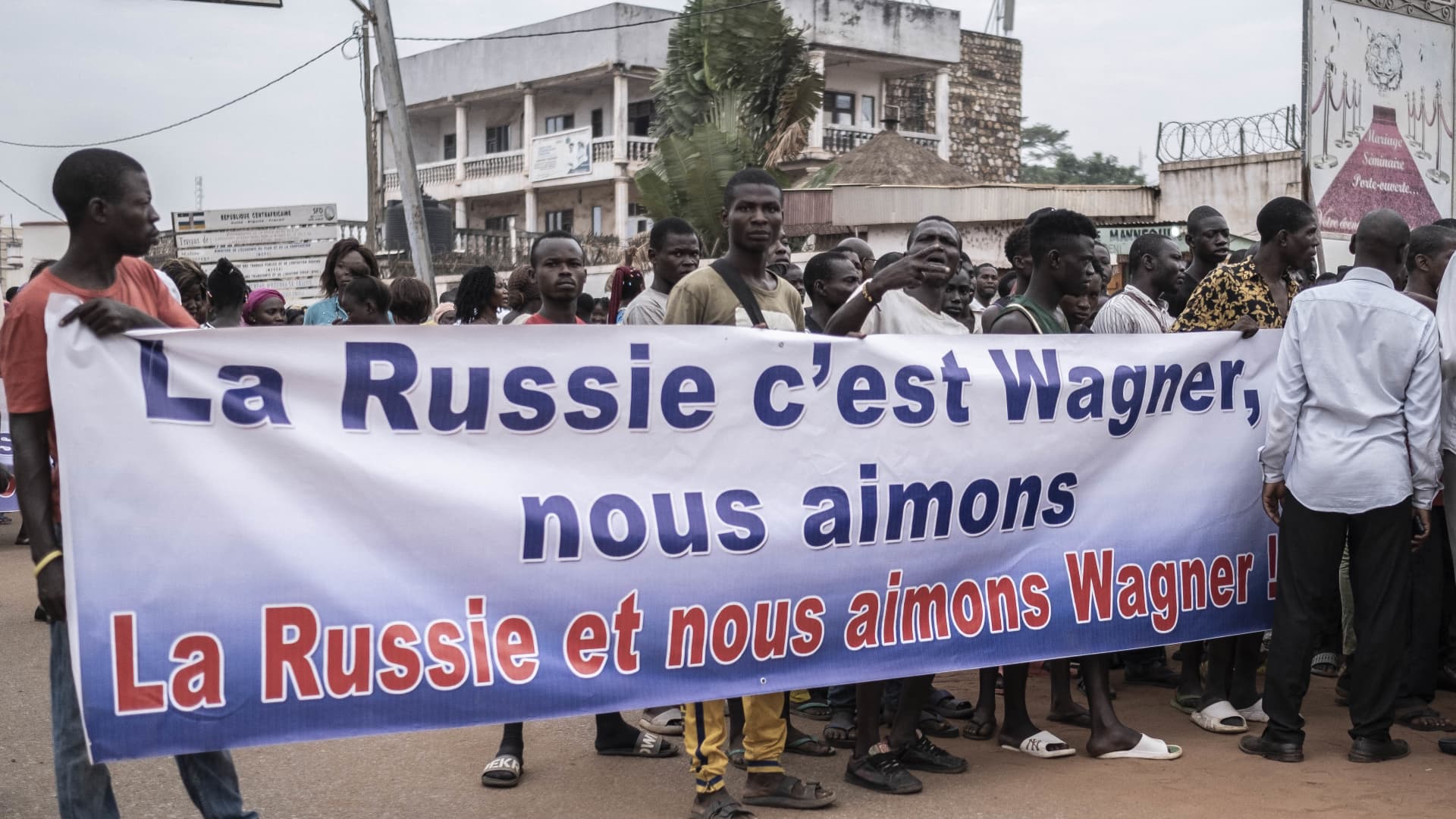BANGUI, Central African Republic – March 23, 2023: Demonstrators carrying banners in Bangui on March 22, 2023, march in support of Russia’s presence in the Central African Republic. Moscow took advantage of the departure of French troops and sent “military instructors” in 2018, followed by Wagner paramilitaries in 2020, at the request of Bangui, in response to a rebel threat.BARBARA DEBOUT/AFP via Getty Images
Since the failed rebellion of the Wagner Group against the Russian military last month, uncertainty has surrounded the operations of the mercenary force worldwide.
The Wagner Group, a paramilitary unit founded by Yevgeny Prigozhin in Russia, is known for its brutality and effectiveness as a private mercenary contractor with close ties to the Kremlin. They often intervene in conflict-ridden states to assist fragile governments in repelling armed insurgencies.
While they played a significant role in Russia’s invasion of Ukraine, securing crucial territories in some of the bloodiest battles of the conflict, the group also has a strong presence in other parts of the world, particularly Africa.
Last week, hundreds of Wagner troops were seen leaving the capital of the Central African Republic (CAR), where the group has its largest overseas presence. This comes shortly after Wagner boss Prigozhin attempted a rebellion in Russia and his troops in Ukraine were ordered to march toward Moscow.
The mutiny was resolved through a deal brokered by Belorussian leader Alexander Lukashenko, which seemingly resulted in Prigozhin’s exile to Belarus. However, there is uncertainty about his current whereabouts.
Questions have also been raised regarding the chain of command in the Wagner Group, with the Kremlin attempting to regain control over the mercenary force. Russian President Vladimir Putin suggested that mercenaries who were not involved in the mutiny could sign contracts with the Russian armed forces instead of surrendering their weapons. However, the Wagner personnel who left CAR reportedly refused to sign these contracts.
The recent departure of Wagner personnel from CAR is still unclear, whether it was a routine rotation of troops, a refusal to sign contracts, or a Moscow-ordered withdrawal to curb Prigozhin’s influence.
However, the Officers’ Union for International Security (OUIS), a U.S.-sanctioned front company for Wagner in CAR, announced that a new wave of fighters had arrived in Bangui, the capital. The OUIS stated that “Russian instructors will continue to aid soldiers in the Central African armed forces to ensure security in anticipation of the constitutional referendum scheduled for July 30.”
Experts suggest that the number of troops leaving CAR seems higher than normal. Observers believe that Prigozhin has reached an agreement with the Kremlin, ensuring that he will not threaten the regime in exchange for managing his business interests and potentially continuing to oversee Wagner’s operations.
Wagner has established a significant presence in Africa over the past six years, both militarily and politically. It serves as a vehicle for Russia to expand its diplomatic and economic interests on the continent. The group has been involved in mercenary activities in CAR, Sudan, Libya, Mali, and Mozambique.
CAR, in particular, has become a location where Russia can pursue its African ambitions. However, a divisive constitutional referendum at the end of the month will test Russia’s efforts to support the government in the face of conflict and human rights abuses.
Wagner has faced accusations of human rights abuses in CAR, but it maintains a strong public image of successfully suppressing rebel uprisings at the government’s request.
France, CAR’s former colonial power, and other Western nations are seeking to rebuild ties with CAR and other African countries where the Wagner Group operates. Additionally, Rwanda has emerged as a potential challenge to Russia and Prigozhin’s influence in Africa.
Rwandan President Paul Kagame has signed agreements to provide security services in Benin and has been involved in repelling militants in Mozambique. Although Rwanda has been effective in its security partnerships, it has also been accused of committing atrocities through its support of rebel groups in the Democratic Republic of the Congo.
The future revenue stream for Wagner is also uncertain, given the strain in their relationship with Moscow following the rebellion. While the group has received funding from the Kremlin, it has also generated its own revenue through commercial activities in CAR.
However, if the Kremlin diverts its funding towards the ongoing war in Ukraine, Wagner’s commercial activities will need to generate quick returns. The gradual expansion seen in CAR is unlikely to be replicated elsewhere.

